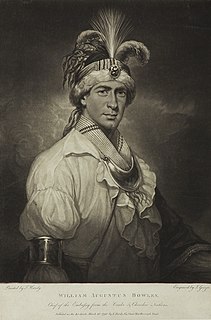 W
WRev. Jonathan Boucher, FRSE, FSA was an English clergyman, teacher, preacher and philologist.
 W
WWilliam Augustus Bowles (1763–1805), also known as Estajoca, was a Maryland soldier and adventurer. Seeing action as a Loyalist during the Revolutionary War, Bowles later formed an alliance with the Muscogee people and attempted to establish an independent indigenous American state with British support.
 W
WBenedict Swingate Calvert was a planter, politician and a Loyalist in Maryland during the American Revolution. He was the son of Charles Calvert, 5th Baron Baltimore, the third Proprietor Governor of Maryland (1699–1751). His mother's identity is not known, though one source speculates that she was Melusina von der Schulenburg, Countess of Walsingham. As he was illegitimate, he was not able to inherit his father's title or estates, which passed instead to his half brother Frederick Calvert, 6th Baron Baltimore (1731–1771). Benedict Calvert spent most of his life as a politician, judge and planter in Maryland, though Frederick, by contrast, never visited the colony. Calvert became wealthy through proprietarial patronage and became an important colonial official, but he would lose his offices and his political power, though not his land and wealth, during the American Revolution.
 W
WElizabeth Calvert was the daughter of Maryland Governor Captain Charles Calvert and Rebecca Gerard, and a wealthy heiress in colonial Maryland. Her parents died when she was young, leaving her their substantial fortune. In 1748, aged 17, she married her cousin Benedict Swingate Calvert, a Loyalist politician and planter and the illegitimate son of Charles Calvert, 5th Baron Baltimore. Benedict's connections to the ruling Calvert family allowed him to benefit from considerable proprietarial patronage, until the American Revolution saw the overthrow of British rule and the end of Calvert power in Maryland. Benedict and Elizabeth had to pay triple taxes after the war's end but, unlike many loyalists, their lands and fortune remained unconfiscated.
 W
WDaniel Dulany the Younger was a Maryland Loyalist politician, Mayor of Annapolis, and an influential American lawyer in the period immediately before the American Revolution. His pamphlet Considerations on the Propriety of Imposing Taxes in the British Colonies, which argued against taxation without representation, has been described as "the ablest effort of this kind produced in America".
 W
WWalter Dulany was a politician in Colonial Maryland, who was mayor of Annapolis from 1766 to 1767. His family house and land at Windmill Point later became the location for the United States Naval Academy.
 W
WSir Robert Eden, 1st Baronet, of Maryland, 23rd Proprietary Governor of Maryland was a British colonial official and the last Royal Governor of Maryland. Although a popular governor and an able administrator, Eden's authority was overthrown by the events of the American Revolution, and in June 1776 he was invited by the Maryland Convention to leave for England. Eden was well-regarded at home and in the same year, 1776, he was made a baronet. He eventually returned to Maryland where he died in 1784 at the age of 42. He was buried in Annapolis and was succeeded in the baronetcy by his eldest son, Frederick, a noted author.
 W
WPhilip Barton Key, was an American Loyalist during the American Revolutionary War and later was a United States Circuit Judge and Chief United States Circuit Judge of the United States Circuit Court for the Fourth Circuit and a United States Representative from Maryland.